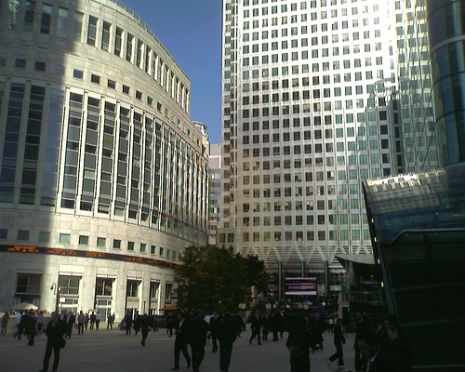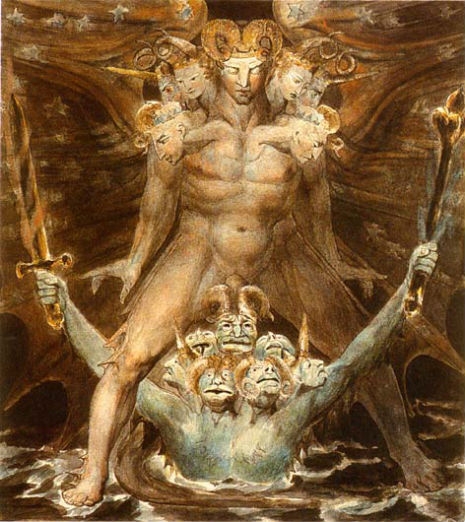
This is a guest editorial from Dangerous Minds reader Em, expanding on some pointed commentary he’s made elsewhere on this blog. Em—who’ll keep his last name to himself, thank you very much—works in the financial industry:
One day you’re going to arise from your habitual feast
To find yourself staring down the throat of the beast they call The Revolution
“They Call It Democracy”—Bruce Cockburn
When Bruce Cockburn sings these lines during a performance, his largely left-leaning audience will often cheer, apparently not comprehending that this is intended to be a cautionary tale. In They Call It Democracy, Bruce is informing the international 1% that time is running out, and that if they don’t use their disproportionately vast resources to reform and truly democratize access to goods and services and capital, then the 99% are going to lose faith in the system itself and eventually overthrow it. And Bruce is fully aware of the fact that The Beast isn’t well represented by romantic notions and Che Guevara T shirts. The Beast is often ugly and brutal and doesn’t always bring in something better. But by the time it comes to that, the 99% will be fully aware of the risks but just won’t give a shit anymore.
That’s why the LIBOR issue is so damned dangerous.
Back in 2009 I was working at a “Too Big To Fail Bank” on Canary Wharf in London, and during my lunch hour walked over to where LIBOR is set and took the above photo. (LIBOR is housed in that building on the left.) Never in my wildest dreams did I imagine, however, that the setting of this key rate upon which the price of mutual funds and derivative securities are indexed, could be easily manipulated by a tiny number of coked-up traders. Although I worked on the retail half of that TBTF Bank, for one summer, I did actually utilize the famous Ho-Lee model to analyze derivative securities for volatility risk. So I knew enough about LIBOR to understand that it is in some ways as important as the prime interest rate, set by the Fed. But I naively assumed that the US and UK governments, along with the Big Banks, would tightly control the LIBOR process because a loss-of-faith in LIBOR could set international markets into chaos.
And that’s the last thing we anyone really wants right now. Right?
But I was wrong. And who knew? Who knew LIBOR could be impacted by such a slipshod and unregulated process? What the hell? Conflicts of interest seem to be practically built into the system, but it only hands out benefits to those in special positions of power. And if I, a banker, can begin to view the system as this deeply corrupt, how will rank-and-file investors feel? Will they put their money into real estate? Hide it in mattresses? That can only accelerate a possible collapse or, worse yet, a revolution.
Revolution? Hah. No one in the US would seriously consider a socialist much less a communist revolution. But those aren’t the only kinds of revolution. The Islamic revolution in Iran in 1979 proves to us that even moderate and reasonably urbane and clever people will sometimes simply choose the devil they don’t know when the Devil they do know (in that case the Shah) has proven beyond all doubt that his system won’t work for most people by design. On purpose. Like the American version of capitalism.
And is that what we really want? OK, maybe in the US we won’t have an Islamic revolution. But who knows what our idiotic science-denying masses might come up with? Maybe the Tea Party was just a first try and all that’s needed now is some less idiotic reformulation that appeals to a wider audience. And remember, it doesn’t have to work in reality, it just has to be able to convince enough people that it might or could be better than the corrupt and closed system most people believe operates today. All it has to do is make a few promises while providing a sort of “purity code” that allows the rank-and-file to throw off outside influence. And for all of its bloodshed and hostages, the Iranian revolution at least returned Iran’s destiny back into the hands of the Iranians, rather than the US and UK-backed torturous regime that was impoverishing practically everybody outside a tiny cabal of the well-connected. And if the Iranians can do it (ie, create a populist strain of Politcal Islam that freezes out external meddling influences), there’s no reason to believe the Americans can’t come up with something of their own in order to lock out and dismantle predatory economics and access structures.
Back in the late 1990s and during the Bush II era, The Fed continued to lower interest rates in order to boost the housing sector. They did this precisely because it worked, and because the traditional industries that provided wealth and capital to the working classes had been strip-mined of value by not only upper-level managers but by Private Equity firms (such as Bain Capital) that searched for value and then capitalized it into their own pockets by moving jobs and manufacturing overseas. As the “Mighty Trucks of Midnight” (another lefty Bruce Cockburn ref there) moved whole industries overseas and Labor imploded, there were fewer and fewer investment opportunities for fund managers. So the steroidally pumped-up housing sector took up the slack while the level of personal indebtedness (to the banks, of course) skyrocketed. We were, in effect, borrowing chunks of our future in order to pay the bankers that colluded with an unregulated system to enrich a very few but without the creation of real new wealth.
When the Great Recession hit, we had to pay the piper for all that debt we had amassed but, Lo! We had no money left. A lot of the money we had been spending had come from debt but now we couldn’t borrow anymore, because the banks were failing and couldn’t make any more loans. And yet, no one really wanted to change anything because it looked like the system was essentially fair so we just had to let it recover a bit so we could all continue on our merry way.
But now, perhaps, we know that wasn’t the real story. And that the system was rigged. We are slowly becoming aware of the fact that only a tiny minority benefit from it while the rest of us work our asses off and still suck shit and struggle every day to feed our families and keep a roof over our heads. As awareness of what LIBOR-fixing really means begins to penetrate popular consciousness, more and more people will begin to question whether the system is even reformable at all. What the 1% and their Walking Dead-like minions do not comprehend, however, is that even if there is a way to reform the system and keep this party rolling a little longer, we are rapidly passing the time where anyone will still believe the system can be reformed. In other words, the window of reform and long-term survival of a system that resembles our current one is closing, and closing rapidly. It will have to be the 1% who choose to utilize their resources in order to give themselves (and their privileged families) a shot at longer-term survival.
That is the only chance the 1% has of keeping the 99% from invoking The Beast, in some form or another.
About the author: After living in China in the late 80s, Em worked in the physics and electrical engineering space until 2002, at which time he moved into the financial world. In July of 2010, Em returned to the US after living in London for several years.

“The Great Red Dragon and the Beast from the Sea” by William Blake